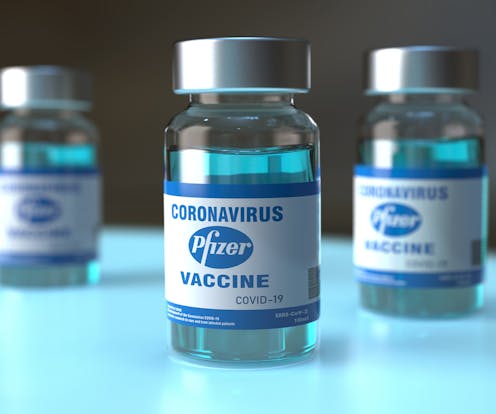People with severe allergies warned off Pfizer COVID vaccine for now. But that may change as more details emerge
- Written by Nicholas Wood, Associate Professor, Discipline of Childhood and Adolescent Health, University of Sydney

Two people in the United Kingdom have experienced an allergic reaction to the Pfizer/BioNTech COVID-19 vaccine. This led the UK medicines regulator to issue precautionary advice earlier this week that “people with a significant history of allergic reactions” should not be given this vaccine for now.
This is an appropriate cautious move. The advice may change once we understand more about what caused these reactions.
Both people reportedly had known allergies and carried adrenaline autoinjectors, suggesting they had a prior history of severe allergic reactions, such as anaphylaxis, a severe and rapid form of allergy.
At this stage, we do not have many further details about the reported allergic reactions to the vaccine.
An advisory panel to the United States Food and Drug Administration (FDA) has recommended the authorisation of the Pfizer/BioNTech vaccine for emergency use. If the FDA grants this approval, it would be the third country behind the UK and Canada to do so.
How common are these types of reactions?
Severe allergic reactions to vaccines are extremely rare, with anaphylaxis occurring after approximately one per million vaccine doses.
Most reactions reported as possible allergic reactions to vaccines are most likely not true allergies.
Regardless, every person is normally asked about their medical history by their immunisation provider, including whether they have any known allergies, especially to a vaccine or its ingredients, before being vaccinated.
Read more: 5 ways our immune responses to COVID vaccines are unique
As almost all severe allergic reactions occur within 15 minutes of exposure to the trigger, it is common around the world to monitor patients for at least 15 minutes after vaccination.
In Australia, it is recommended that any facility where vaccinations are delivered is equipped with the equipment and trained staff to recognise and treat allergic reactions. This applies to all vaccines, including COVID-19 vaccines.
What types of allergens are we talking about?
People can be allergic to a wide range of substances (called allergens), including foods and medications. If someone has a known allergy to a vaccine ingredient, they may be advised not to have that vaccine.
The Pfizer/BioNTech COVID-19 vaccine does not contain any ingredients that commonly cause allergic reactions, and the full list of ingredients has been published by the UK medicines regulator.
It is likely the two people who may have had an allergic reaction after the Pfizer vaccine will be reviewed by an allergy/immunology specialist. If found that they truly had anaphylaxis they would be unlikely to be given the second dose of the vaccine.
However in some situations, people who have had allergic reactions after one dose may be able to receive further doses of the same vaccine using a specialised approach, such as graded dosing, which can avoid triggering a reaction. This approach has not yet been reported for any COVID-19 vaccine.
Aren’t clinical trials supposed to pick up issues like this?
People with a history of severe allergic reaction to a vaccine or to any ingredient of the Pfizer/BioNTech vaccine were not included in the late phase clinical trial for this vaccine.
This is a precaution designed to protect the safety of the trial participants. Clinical trials usually focus on healthy people without underlying medical conditions, although the Pfizer phase 2/3 trial allowed enrolment of people with stable pre-existing chronic conditions.
Once the safety and effectiveness of a vaccine is well established in healthy people, it can then be offered to other populations, such as people with severe underlying medical conditions.
This trial includes more than 40,000 participants and has shown the vaccine to be safe and well tolerated, with no serious safety concerns. The incidence of allergic-type symptoms after vaccination was slightly higher in the vaccinated group at 0.63% compared with the placebo group at 0.51%, however it is not clear whether this slight difference is due to chance.
Read more: 'Very convincing evidence': Pfizer now has the data it needs to apply for COVID vaccine approval
What are the implications for people with significant allergies?
As to the implications of this latest news for people with significant allergies, it’s too early to tell. We still don’t know if these reports were true allergic reactions.
There is also no theoretical reason to suspect allergic reactions would be more common with COVID-19 vaccines than with other vaccines, even those using newer technologies.
As always, people should discuss their medical history with their vaccine provider, including any history of allergy.
Read more: From adenoviruses to RNA: the pros and cons of different COVID vaccine technologies
We still need ongoing monitoring
Given COVID-19 vaccines will be delivered to millions of people around the world, it’s inevitable some adverse events will be reported. There is potential for an adverse reaction with any medication or vaccine, and that’s why people are monitored after being given a vaccine. A consideration of the risks and benefits is always important when considering whether to have a vaccine.
More than 1.5 million people have died from COVID-19 so far, and thousands more are dying each day. The benefits of vaccination will far outweigh the risks, particularly for the priority population groups most vulnerable to COVID-19.
Ongoing monitoring of COVID-19 vaccine safety is also crucial and will allow us to detect side effects that may be very rare, or which may be related to an underlying medical condition.
In Australia, we’ll be doing this with a robust vaccine safety surveillance system, which will be used to monitor the safety of any licensed COVID-19 vaccines in near-real time, and which will provide publicly available updates.
Authors: Nicholas Wood, Associate Professor, Discipline of Childhood and Adolescent Health, University of Sydney





